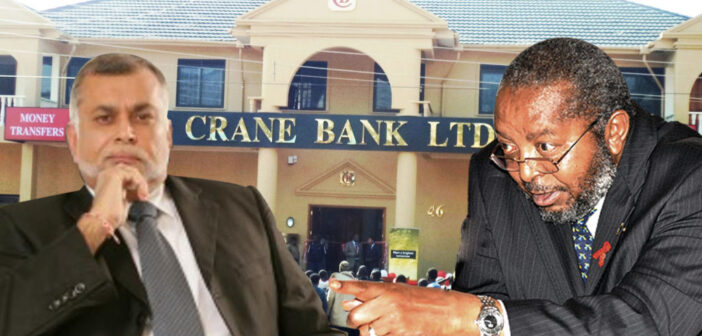The Bank of Uganda (BOU) has said it will be petitioning the Supreme Court against the dismissal of the UGX.397BN Crane Bank case, by the Court of Appeal claiming the judgement of this case has a crucial precedent that affects its powers.
The Court of Appeal last week dismissed an appeal filed by Bank of Uganda against an earlier judgment that had dismissed a shs397 billion commercial dispute between Crane Bank (in receivership) and businessman Sudhir Ruparelia.
In a statement signed by the Governor BoU, Prof. Emmanuel Mutebile, assured the public that it is committed to pursuing the matter to its logical conclusion.
“In exercise of its powers under sections 87(3), 88(1)(a)&(b) of the Financial Institutions Act, 2004, BoU placed Crane Bank Ltd (In Receivership) [“Crane Bank”] under Statutory Management on 20th October 2016. This decision was necessary upon discovering that Crane Bank had significant and increasing liquidity problems that could not be resolved without the Central Bank’s intervention given that Crane Bank had failed to obtain credit from anywhere else. An inventory by external auditors found that the assets of Crane Bank were significantly less than its liabilities. In order to protect the financial system and prevent loss to the depositors of Crane Bank, Bank of Uganda had to spend public funds to pay Crane Bank’s depositors,” a statement dated June 30, 2020 and signed off by Prof. Emmanuel Tumusiime–Mutebile (pictured), the Governor, BoU reads in part.
“A subsequent forensic investigation as to why Crane Bank became insolvent found a number of wrongful and irregular activities linked to Sudhir Ruparelia and Meera Investments Ltd. These findings form the basis of the claims in the lawsuit by Crane Bank. The suit was necessary for recovery of the taxpayers’ money used to pay depositors’ funds as well as the other liabilities of Crane Bank. BoU set about resolving the affairs of Crane Bank in a manner that would safeguard depositors, preserve the safety of the financial system, and restore the taxpayers’ money that had been deployed to prevent loss to depositors and a potential financial crisis,” the statement adds.
In August 2019, Bank of Uganda (BOU) /Crane Bank (in receivership) sued Sudhir Ruparelia and Meera Investments Limited for allegedly fleecing the defunct Crane Bank Limited (CBL) of Shs397 billion that the central bank wants to be refunded.
BOU claimed that Sudhir illegally and secretly owned 100 percent shareholding in Crane Bank in breach of the law, and wrongfully used this position to illegally extracted money from CBL.
BOU also stated that Sudhir transferred freehold property owned by CBL into names of Meera Investments Ltd in which he and his family are majority shareholders without giving value to CBL and rendering the Bank a tenant on its own property with a liability to pay rent to Meera Investments Ltd.
In response, Sudhir Ruparelia and Meera Investments Ltd filed a defense and later an application arguing that Crane Bank had no capacity to sue
CRANE BANK TO APPEAL TO SUPREME COURT
“Under this agreement Sudhir Ruparelia only paid USD 8,000,000 and regrettably later refused to comply with his undertakings.
It was at this point that BoU as receiver of Crane Bank instituted a High Court case H.C.C.S 493 of 2017 against Sudhir Ruparelia and Meera Investments Ltd,” BoU says.
It adds that the main claims in this suit based on the findings of the forensic investigation are that;
i. Sudhir Ruparelia illegally and secretly owned 100% shareholding in Crane Bank in breach of the Financial Institutions Act, 2004.
ii. Using that position of control, Sudhir Ruparelia wrongfully and illegally extracted from Crane Bank amounts totalling to USD 92,830,172 and UGX 8,277,000,000.
iii. Sudhir Ruparelia transferred freehold property beneficially owned by Crane Bank into the names of Meera Investments Ltd in which he and his family are the majority shareholders, without giving value to Crane Bank and rendering the Bank a tenant on its own property with a liability to pay rent to Meera Investments Ltd.
In response, Sudhir Ruperalia and Meera Investments Ltd filed a defence and later an application arguing that Crane Bank had no capacity to sue them while in receivership and that upon transfer of some of its assets to DFCU Bank, Crane Bank ceased to exist. Both the Justice at the High Court and those at the Court of Appeal upheld these arguments.
“Bank of Uganda maintains that receivership does not take away the corporate personality of a company which includes the right to trace and recover assets and the right to sue for those assets. The public is also invited to note that neither the High Court nor the Court of Appeal has yet considered or taken a decision on the claims for wrongful and illegal extraction of funds from Crane Bank as claimed in the main suit,” BoU says.
It adds: “The implications of these judgments are that a Receiver of a financial institution/bank cannot pursue or seek recovery of assets of a bank in receivership by way of legal proceedings. This renders the principle of tracing and preserving assets of an insolvent bank during statutory management and receivership futile.
The judgments also set a precedent that limits the Central Bank’s capacity to resolve banks in a manner that ensures accountability for mismanagement of depositor funds and promotes good corporate governance in the banking industry.
For these reasons, BoU as receiver of Crane Bank is dissatisfied with the rulings of both the High Court and the Court of Appeal and has taken a decision to appeal to the Supreme Court in addition to pursuit of other legal recovery options.
BoU wishes to reassure the public that it is committed to pursuing this matter to its logical conclusion.”



